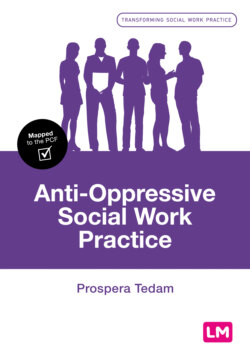Читать книгу Anti-Oppressive Social Work Practice - Prospera Tedam - Страница 81
На сайте Литреса книга снята с продажи.
Chapter summary
ОглавлениеThe social work profession challenges the exercise of power which is oppressive, discriminatory and damaging. Acknowledging and understanding the impact of their own informal and coercive power is crucial, as is recognising how their teams and organisations may perpetuate the oppressive use of power through their policies and guidelines. It remains unclear about the extent to which social work qualifying programmes prepare students for working constructively with power and understanding the role of power in their daily interactions with service users and their families. It may well be that, as a student, you fail to understand how power is exercised in practice, or you may be unaware of the power that your role as a social worker gives you.
In this chapter, I have tried to demonstrate how complex and contested the concept of power is, and the different ways in which it manifests in social work interventions and interactions. Power is not a commodity to be given away; hence, when social workers talk about empowering service users, it is not ‘giving’ power, but rather it is supporting service users to gain control of their lives and the decisions affecting them. Within the context of anti-oppressive practice, power will continue to be an ever-present consideration for social work students and practitioners alike.
